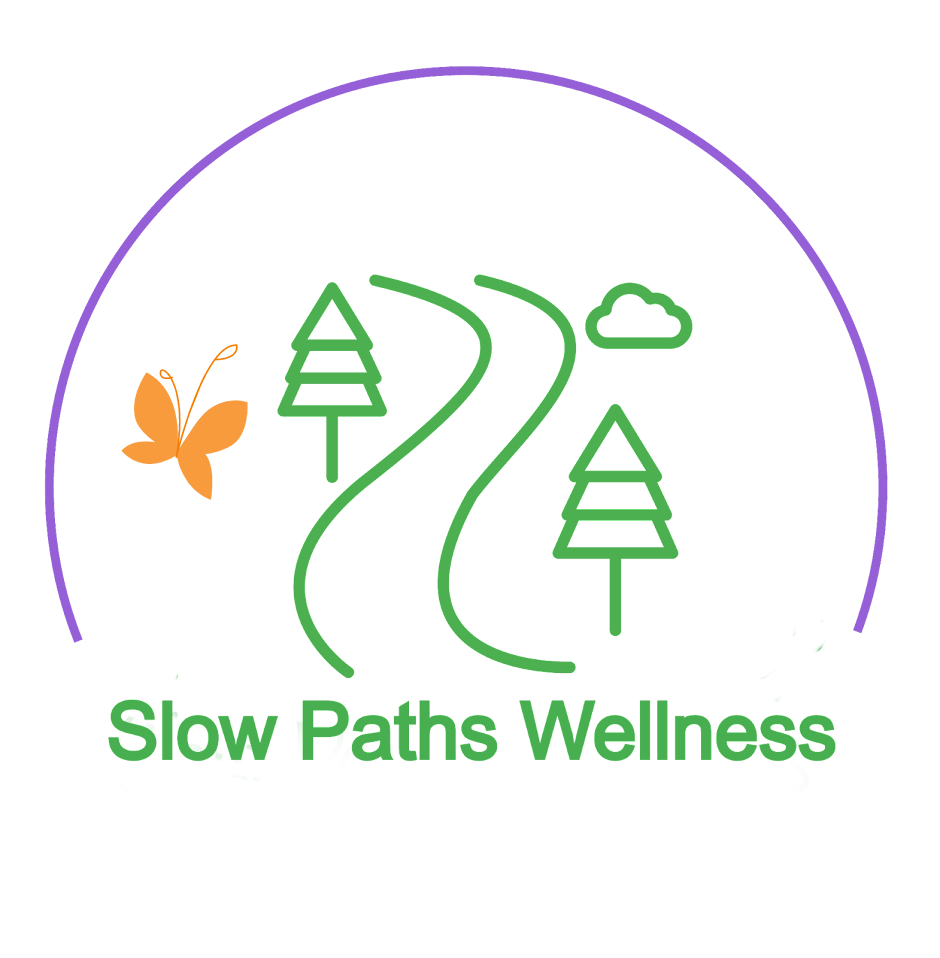What a crazy year 2020 is for everyone on earth! My life is no different. After a lot of thought, I've moved, renamed, and revamped my practice. My office is now at 201 N. Washington Highway, Suite 204, in the SoNa Bank building in Ashland. My new name, as you can see, is Slow Paths Wellness. And the revamping?
For years, I've slowly moved to the idea that life is improved in tiny doses. Tiny, friendly, honest, filled-with-curiosity-and-compassion-towards-self-and-others. These tiny doses danced around in my head and became are becoming the Slow Paths Manifesto. I believe it will be an evolving outlook, but for now, here's the basis for my practice:
1. Be Team YOU You are the only person you can change or grow, and if you don't care for yourself, learn to like yourself, and care for your interests, you can't live the meaning you want for your life. Having a good sense of and care of self strengthens the Earth Element, which also deals with digestion and energy levels.
2. Feel Your Feelings Over several years, I've spent hundreds of hours on books, podcasts, classes, blogs, videos, and just listening to people I found wise on various aspects of health. As I learned in school for Asian medicine, every illness is effected by your emotional state. And emotional states generally only cause problems when something keeps you from processing your feelings. Learning to feel your feelings rather than work / exercise / eat / otherwise-distract-yourself-from-them is a skill that will bring more vibrancy, resilience, and calm to your life. Not having stuck feelings helps your Wood Element function correctly, which helps mood, deals with pain, proper hormonal function, sleep, and healthy muscles and tendons.
3. Love Your Limits The more I read about living a fulfilling life with a minimum of resentment or disappointment, the more I see the word "boundaries." Boundaries are about more than telling people not to do things that annoy you or doing too much for other people. They are about learning who you are, who you are not, and making it easier to do the things you want to do in life. Boundaries help the Metal Element, which deals with your immune system, ability to grieve and let go of things, and has a big role in organization.
4. Commit to Curiosity Becoming yourself, looking at the situations in your life with an eye to moving towards what you want, and evaluating the information you come across--they will all work more easily if you let yourself be kindly curious. Curiosity can look like wondering if the pain you feel could change with diet, or being willing to go to the doctor for a test. It can be wondering why a person does an annoying behavior, and possibly asking them about it rather than making assumptions. It can be deciding to try something new (like acupuncture!) for a nagging problem. Curiosity takes some of the pressure off of your mind to need to always KNOW and answer. It allows you to see the nuance in life's circumstances, instead of looking at any issue as all or nothing. Often, that can make it easier to pivot when challenges come up. Curiosity nourishes the Fire Element, which also deals with thought, speech, vascular health, and your social interactions.
5. Take Your Time--It's Yours This may become the Slow Paths motto. Life takes time. Change takes time. Growth doesn't happen overnight, although insight can be instantaneous. Making time to have the life you want gets you off the hook of always feeling behind and rushed. Making time nourishes the Water Element, which also deals with genetic activity, being calm, creative thought, and brain and endocrine function.
Over the next few months, I will be talking more about each of these principles, how they relate to Asian medicine, and how incorporating them into your life will help you move towards what you want in life.

